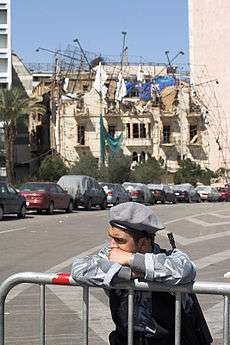United Nations Security Council Resolution 1595
United Nations Security Council resolution 1595, adopted unanimously on 7 April 2005, after recalling its support for the sovereignty, territorial integrity and independence of Lebanon, the Council established a commission to assist Lebanese authorities in their investigation of the assassination of former Prime Minister Rafic Hariri in Beirut on 14 February 2005.[1]
| UN Security Council Resolution 1595 | |
|---|---|
 Site of Rafic Hariri's assassination | |
| Date | 7 April 2005 |
| Meeting no. | 5,160 |
| Code | S/RES/1595 (Document) |
| Subject | The situation in the Middle East |
Voting summary |
|
| Result | Adopted |
| Security Council composition | |
Permanent members | |
Non-permanent members | |
The resolution effectively established the United Nations' first-ever murder investigation.[2]
Resolution
Observations
In the preamble of the resolution, the Council condemned the assassination of Rafic Hariri in the Lebanese capital, and urged all concerned to act with restraint. A fact-finding mission had reported that the Lebanese investigation into the incident would reach a satisfactory or credible conclusion.[3] Therefore, the Council decided that an international independent investigation would be necessary, as it was aware that those responsible for the attack had to be identified and held accountable. It thanked the Lebanese government for approving permission for an international inquiry.
Acts
The Council established an international commission to investigate the assassination and identify the perpetrators, further calling upon the Lebanese government to ensure its findings were taken fully into account.[4] It stated that the commission would have full freedom of movement, co-operation from Lebanese authorities, collect additional evidence and have the necessary facilities in order to perform its functions appropriately.[5] The Secretary-General Kofi Annan was asked to assist in the establishment of the commission and recruitment of its staff.
All countries were called upon to co-operate with the commission, which was instructed to complete its work within three months, though the Secretary-General could authorise an additional three-month extension if required.
See also
References
- "Security Council establishes commission to assist investigation into Beirut bombing that killed former Lebanese Prime Minister". United Nations. 7 April 2005.
- Rubin, Barry M. (2009). Lebanon: liberation, conflict, and crisis. Palgrave Macmillan. p. 68. ISBN 978-0-230-60587-9.
- Australian Associated Press (8 April 2005). "UN Hariri inquiry set up". TVNZ.
- Saul, Ben (2006). Defining terrorism in international law. Oxford University Press. p. 220. ISBN 978-0-19-929597-5.
- Neisloss, Liz (8 April 2005). "Security Council to open Hariri probe". CNN.
External links

- Text of the Resolution at undocs.org